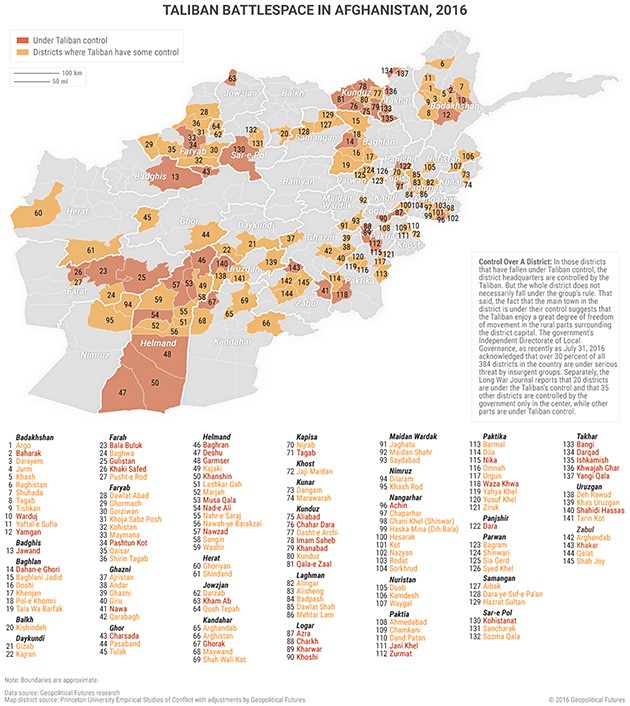Afghanistan Is America's New Vietnam Unwinnable War
Politics / Afghanistan May 08, 2017 - 05:18 PM GMTBy: John_Mauldin
 BY GEORGE FRIEDMAN AND KAMRAN BOKHARI : There is a paradox when it comes to views about Afghanistan. No one would disagree that after 15 years, the Afghan state built by the West remains ineffective. Yet, no one is willing to accept that if present trends continue, the clear outcome will be regime collapse.
BY GEORGE FRIEDMAN AND KAMRAN BOKHARI : There is a paradox when it comes to views about Afghanistan. No one would disagree that after 15 years, the Afghan state built by the West remains ineffective. Yet, no one is willing to accept that if present trends continue, the clear outcome will be regime collapse.
The Afghan government is unable to thwart a growing jihadist insurgency dominated by the Taliban. Nor is it able to prevent the Islamic State (IS) from expanding its footprint in the country. Worse is that increased factional infighting is gutting the Afghan political system from the inside.
US President Trump and his team are engaged in a bottom-up review of US military commitments… not just in the Afghan state but across the globe.
Afghanistan Is The Longest War In American History
The Afghan state is a special case. It is the longest running war in American history. The US currently has almost 10,000 troops there. They operate in a supportive role to Afghan National Security Forces (ANSF).
The ANSF have primary responsibility for combat operations. But, they have shown that they are not able to deal with the Taliban insurgency. In the past three years, the ANSF have also faced a growing IS presence in the country.
The Taliban remain the dominant jihadist force and they have spread across the country. They now reach even into the north. They couldn’t previously penetrate there. Not even during the regime’s pre-9/11 heyday.

This is a war that cannot be won. And the US cannot continue to lose troops there. Washington still might stay in the hope that its deployment would give enough time for the Afghan forces to come up to speed. But that outcome is more and more elusive.
Afghan forces are losing ground to jihadist insurgents. They also suffer from a huge intelligence problem. The Taliban have penetrated the Afghan forces’ ranks. This is obvious from the many attacks that have taken place over the years due to security breaches.
On April 21, Taliban attackers entered a key army base in the northern Balkh province. They wore military uniforms and had bona fide identification. They also used military vehicles. That attack killed at least 150 soldiers in the compound.
The government has lost two central leaders since 2013. Since then, the Taliban’s war-making capabilities have not been dented. In fact, the Taliban insurgency continues to grow. The April 21 attack led to the resignations of the defense minister and the army chief.
The Afghan Government Is Unraveling
President Ashraf Ghani has since appointed replacements. But such moves are political in nature. And they have happened many times before. Afghan forces have never been well equipped to deal with insurgents. And the new appointments are unlikely to change that.
The problem is not simply weak security forces. The malaise runs much deeper. The Afghan state that the West built to replace the Taliban never really took hold and is now unraveling.
Low Morale Is Leading To Desertions And Defections
Those serving in the Afghan National Army, the Afghan National Police, and the National Directorate of Security (the intelligence service) see that the country’s political system is in tatters.
At the same time, they are targeted by a ferocious insurgency. And that uprising is gaining steam across the country. This does not bode well for morale.
The security forces’ confidence in the regime is declining. This downward trend cannot be stopped.
Such situations lead to a growing number of retreats from battlefields. There are also desertions from the ranks and defections to the insurgency. The rise of militias led by warlords is also a problem. The political system cannot endure.
No one in Washington is willing to officially admit there is a problem. But the US leadership is aware of the writing on the wall. There is nothing that the US can do to turn things around.
Is Afghanistan Another Vietnam?
There seems to be no solution. If there were, it would have been implemented long ago. We would not be in the 17th year of that war. American military power has limits. Of course, Washington can take down regimes. But it does not have the power to rebuild a nation. Nor can it pacify a country.
The US is likely to cut its losses and pull out as it did in Vietnam. At some point, the government in Kabul would collapse. What would be left is civil war. And that would be a continuation of Afghanistan’s history over the last four decades… with a new chapter.
Grab George Friedman's Exclusive eBook, The World Explained in Maps
The World Explained in Maps reveals the panorama of geopolitical landscapes influencing today's governments and global financial systems. Don't miss this chance to prepare for the year ahead with the straight facts about every major country’s and region's current geopolitical climate. You won't find political rhetoric or media hype here.
The World Explained in Maps is an essential guide for every investor as 2017 takes shape. Get your copy now—free!
John Mauldin Archive |
© 2005-2022 http://www.MarketOracle.co.uk - The Market Oracle is a FREE Daily Financial Markets Analysis & Forecasting online publication.



